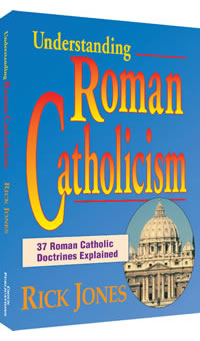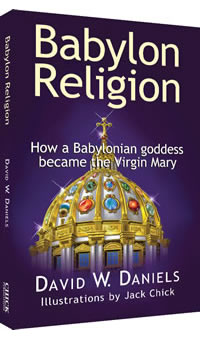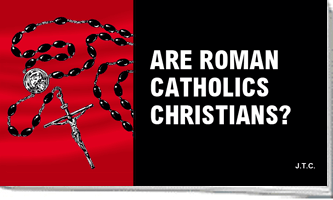Five Pillars of Reformation Truth
Every believer should know the foundational issues on which Martin Luther and the others stood when they rose up to denounce the pope as the antichrist.
The Reformation was one of the greatest events in world history. Essentially, it was a work of God concerned with the truth of biblical doctrine. Roman Catholicism was rejected, because it was seen that it was not the religion of Jesus Christ.
Today, we witness high-level attempts to undo the glorious work of the Reformation. In a speech by the Archbishop of Canterbury, he intimated that papal primacy might be acknowledged in the Church of England, and he called upon Christians everywhere to accept the Pope as leader of the universal Church.
This is a betrayal of our Protestant faith and a contemptuous rejection of our Reformation heritage.
In view of the prevalent confusion, it is necessary to restate the principles of Reformation truth and to examine Romanism in the light of them.
"Sola Scriptura" — By Scripture Alone
The Holy Scriptures of the Old and New Testaments, as inspired by God, are the sole and sufficient authority in all matters of faith and practice. The written Word stands gloriously alone in its majesty. It testifies in God's name.
We reject Rome's authorities, which are "Holy Mother Church, the Apocryphal books, the (supposed) unanimous consent of the Fathers, the decrees of Councils, unwritten traditions, and the decisions of the Popes." See 2 Timothy 3:16 & 17.
"Sola Gratia" — By Grace Alone
Grace is the unmerited favor of God, or His free love. People have done nothing to deserve it. By grace, God redeems them through Jesus Christ, calls them by the Holy Spirit, justifies them by faith, adopts them into His family, and preserves them unto eternal life.
The scheme of salvation taught by the Church of Rome includes the doctrine of merit: "Good works do truly deserve eternal life; and whosoever holds the contrary, is accursed." See Romans 11:6
"Solo Christo" — By Christ Alone
Christ is set forth in Scripture as a mediator. Only through Christ can we have acceptance with God. He is the only way of access into God's presence and the only channel by which blessings are bestowed.
Rome, however, interposes many mediators. First of all, there are the priests. Then, there are those "above" who mediate, such as the Virgin Mary, departed saints and holy angels.
Is there any scriptural warrant for all this? No, none whatsoever. These things are expressly forbidden. See 1 Timothy 2:5-6
"Sola Fide" — By Faith Alone
Faith is simply the sinner's personal reliance on Christ as Saviour. God only justifies us when, in our desperation, we flee to Christ and place our entire confidence in His substitutionary life and death.
The Roman Catholic Church denies this.
According to Roman dogma, "The instrumental cause (of justification) is the sacrament of baptism," and, "through the observance of the Church, faith co-operating with good works..." enables people to be "further justified"! (The Decrees of the Council of Trent) See Romans 5:1 or Galations 2:16
"Soli Deo Gloria" — Glory To God Alone
The true doctrine magnifies God's grace in salvation and causes us to lift high the voice of adoring praise and thanksgiving, so that all the glory is given to God through our Lord Jesus Christ. The Romanist doctrine exalts the pope, the priests and, by its doctrine of salvation by works, believers themselves.
It is a man-centered religion, very far removed from the religion of the New Testament. The Truth rediscovered in the Reformation brought the glory back to God.
May God in our day revive these great truths for which many Reformers died, and may He teach His people the impossibility of common ground or union with Rome.
- See more articles on related topics:
- Ecumenism
- For Christians
- History
- Other Subjects
Other Articles from March/April 1991:
More on Other Subjects:
Products of Interest:
-

Smokescreens
96 pages
Jack Chick shows that the ecumenical movement isn’t designed to bring all Christians into unity. That’s just a smokescreen, hiding the Vatican’s real intent, to stamp out religious freedom and rule the world. -

Understanding Roman Catholicism
224 pages
37 Catholic doctrines from the current Catechism are compared with the Scriptures. They're not Christian! -

Babylon Religion
224 pages
Learn how a Babylonian goddess became the Virgin Mary. An easy-to-read history of Catholicism's Babylonian origin. 
Are Roman Catholics Christians?
Show Catholics that neither their good works nor their religion can save them.



